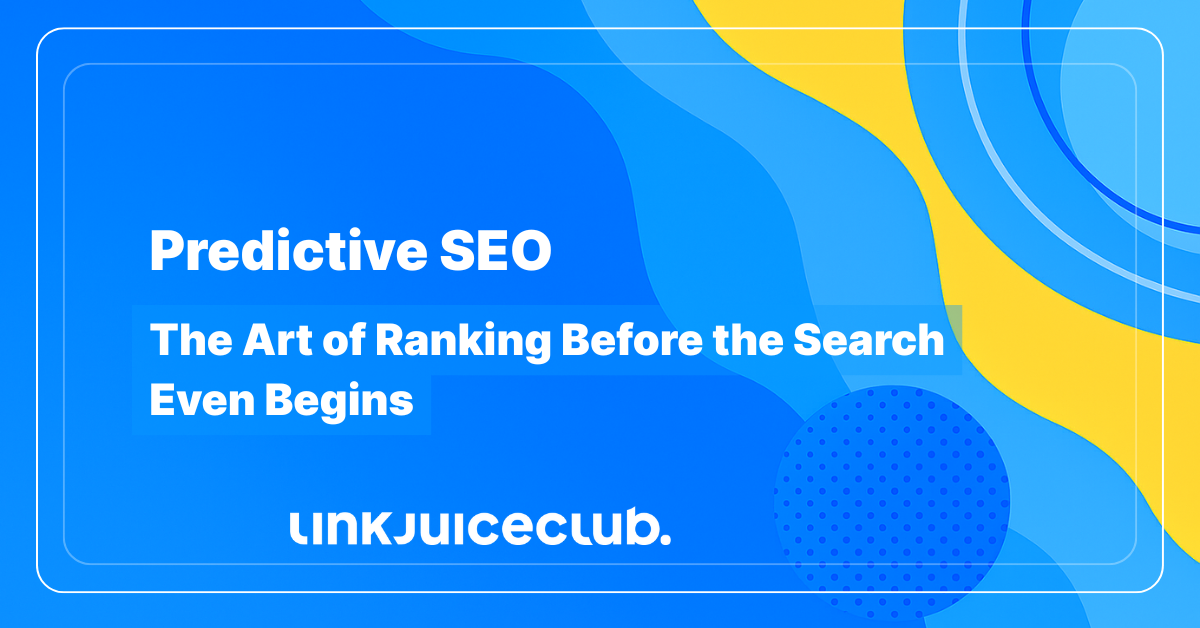
Predictive SEO: The Art of Ranking Before the Search Even Begins
Let’s flip the SEO game on its head for a second.
What if you could rank before people even knew what they were searching for? Welcome to the wild world of predictive SEO, where the smartest brands show up early, grab attention first, and leave the competition wondering what just happened.
This isn’t some futuristic fantasy. Predictive SEO is already reshaping how content gets created, optimized, and discovered.
And if you’re still relying on last month’s keyword data to plan next month’s strategy? You’re not just behind – you’re invisible.
So, how do you get ahead of the curve? 😉
What Predictive SEO Actually Does (And Why It’s a Game-Changer)
In simple terms, predictive SEO is about outsmarting the algorithm by aligning with user behavior before it spikes. Instead of playing catch-up with yesterday’s trends, you’re using AI-powered tools to forecast tomorrow’s search demand (and optimizing accordingly).
It’s not guesswork. Tools like Google’s RankBrain, MUM, and BERT are already crunching behavioral data, context, and semantics to predict what users want before they even finish typing.
These algorithms look beyond keywords; they dissect user intent, timing, and even mood to refine the results.
With predictive SEO, you’re not waiting for demand to happen. You’re preparing for it, publishing content just as interest starts to build, not after it’s already peaked. 🤙
How AI Pulls Search Trends Out of Thin Air (Almost)
Here’s the truth: AI is always two steps ahead! That’s the superpower behind predictive SEO, and it’s all thanks to machine learning models that are constantly feeding on data like it’s an all-you-can-eat buffet.
From the way you type, to the device you’re using, to what’s trending on Reddit right now, AI is soaking it all in.
And then? It makes eerily accurate predictions about what you (and everyone else) will search next. ✔️

Your Results, Your Rules
One of the biggest flexes of modern AI is its ability to tailor search results based on who you are, where you are, and what you’re doing.
Looking up something in New York on a smartphone while waiting for a train? Your results won’t look the same as someone searching the same thing in Sydney from a desktop.
AI takes into account your location, device type, previous browsing behavior, and even the time of day to fine-tune the results. It’s like a search engine that actually knows you (spooky, but powerfu!)l.
For marketers, this means your content has to be hyper-relevant and context-aware to win visibility in this ever-shifting SERP landscape.
Listening and Learning in Real Time
Hey Siri, what’s the weather like in Paris next weekend?
Voice search is a goldmine of real-time data. Tools like Google Assistant, Alexa, and Siri are constantly capturing how users ask questions naturally, which gives AI a direct window into how humans speak, not just type.
This helps Google prep content that aligns with conversational patterns and gives content creators a chance to rank for multi-layered, long-tail voice-driven searches before they even spike.
Every Click Tells a Story
AI is a relentless observer. It watches where people click, how long they stay on a page, whether they bounce instantly, or keep browsing. All that user behavior gets packaged into powerful insights that reveal what’s actually useful, not just what’s keyword-stuffed.
When patterns emerge, the algorithm starts connecting dots and predicting what kind of content users really want.
Spotting the Wave Before It Breaks
Google doesn’t wait for topics to go viral; it often sees the trend coming from a mile away. By analyzing sudden spikes in search volume, tracking real-time news coverage, social chatter, and Reddit rabbit holes, AI can sniff out a trend before it becomes mainstream.
This means you don’t have to guess anymore. You can create content that ranks just as a topic starts climbing, and ride the wave instead of paddling behind it.
Future-Proofing Your SEO: How to Optimize for Searches That Haven’t Peaked Yet
Spotting a trend early is cool. But ranking for it before it explodes? That’s where the real SEO magic happens.
If you’re trying to future-proof your site, you’ve got to do more than chase keywords. You need to anticipate intent, position your content for visibility, and stay agile as the trend evolves. 🧐

Focus on Intent (Because Keywords Alone Don’t Cut It Anymore)
Gone are the days when SEO was a keyword-stuffing contest. These days, AI is obsessed with why people search, not just what they type.
That means your content needs to go deeper. Instead of targeting a single term, think in questions, context, and next-step queries.
Predict what users will want to know after the first click, then serve it up before they even ask. Long-tail, conversational phrases are your best friend here, especially as voice search continues to grow. Speak like a human, rank like a machine!
Make Evergreen Content That Bends, Not Breaks
Trends fade. But smart content lives on.
If you’re trying to get ahead of future searches, your best bet is to build evergreen content that adapts.
Create core pillar pages that anchor your authority, and weave in flexible subtopics that can be updated as trends evolve. This structure keeps your content relevant, crawlable, and continually ranking.
Think of it like building a foundation with room to grow, instead of constantly starting from scratch.
Win the Snippet Game and Dominate Zero-Click Territory
Want to be the first thing a searcher sees? Time to optimize for zero-click results.
AI-powered search engines love clear, direct answers, and that’s exactly what featured snippets are all about.
Structure your content with FAQ sections, concise summaries, schema markup, and clean headers to increase your chances of landing that prime SERP real estate. If your content answers a question faster than anyone else, you win, even if the user never clicks through.
Bonus? You start building brand visibility before they even hit your site.
Keep Your Ear to the Internet (Yes, Even Reddit)
The best content creators aren’t just keyword researchers; they’re conversation hunters.
Use tools like Exploding Topics, Google Trends, and social listening platforms to catch signals early. But don’t stop there. Dive into Reddit threads, niche forums, TikTok trends, and even Twitter/X debates. These digital watering holes are gold mines for spotting what people care about before the rest of the web catches on!
The earlier you spot the conversation, the earlier you can publish content that ranks when the masses come looking.
Predictive SEO Isn’t All Sunshine and Rankings
Sure, predictive SEO is exciting (I mean, who doesn’t want to rank before the crowd even shows up?). But like any shiny new strategy, it comes with a few potholes you’ll want to avoid.
Let’s talk about the messy stuff: the challenges, the risks, and the gotchas that come with forecasting the future of search. 🤔
Visibility Without the Clicks
Welcome to the paradox of modern SEO: your content ranks, your answer shows up, and the user… never actually visits your site.
Thanks to AI-powered snippets, knowledge panels, and answer boxes, users often get exactly what they need right on Google’s results page – no click required. While this is great for UX, it can tank your organic traffic.
You’re still building visibility and brand authority, but you’ll need smarter ways to drive engagement, like optimizing for brand recall, rich snippets, or post-snippet calls to action.
AI Bias and the Danger of Getting It Wrong
Here’s the dark side of data: AI can only learn from what it’s fed, and if that data is biased or flawed, your content strategy could be too.
Sometimes algorithms misread intent or favor sensational content over substance. That means you might rank for something irrelevant (or worse – problematic) if you’re not watching closely.
Avoid this by combining AI tools with good old-fashioned human oversight. Trust the data, but verify the direction.
The Creepy Line Is Thin
AI loves data, but not everyone loves how it’s gathered. Predictive SEO often relies on behavioral insights, device tracking, and geolocation cues, which can raise some serious privacy flags if not handled properly.
If you’re pulling user data, you must play by the rules: GDPR, CCPA, and whatever acronym comes next. Use anonymized insights, be transparent about your data sources, and don’t sacrifice ethics for rankings.
Nothing kills credibility faster than being labeled creepy.
Today’s Tactics, Tomorrow’s Trash?
Let’s not pretend SEO has ever stood still, but with AI moving faster than ever, it’s even harder to know which strategies will stick.
What works this month might flop next quarter. Algorithms evolve. Ranking signals shift. And your carefully built content hub might be outdated by the next core update.
This isn’t a reason to avoid predictive SEO; it’s a reason to stay nimble. Test often. Adapt faster. And don’t put all your SEO eggs in one machine-learning basket.
The Future Isn’t Just SEO (It’s Predictive SEO)
No, AI isn’t a mind reader (yet). But when it comes to search, it’s getting dangerously close. We’ve officially crossed the line from reacting to queries… to predicting them.
This is where predictive SEO takes the spotlight. By embracing AI’s forecasting power, businesses can rank for tomorrow’s searches today.
Sticking to old-school SEO methods? That’s like showing up to a Formula 1 race with a horse and buggy. As search engines evolve, so must your strategy.
Predictive SEO isn’t a nice-to-have. It’s the future-proofing your site deserves. 💪





